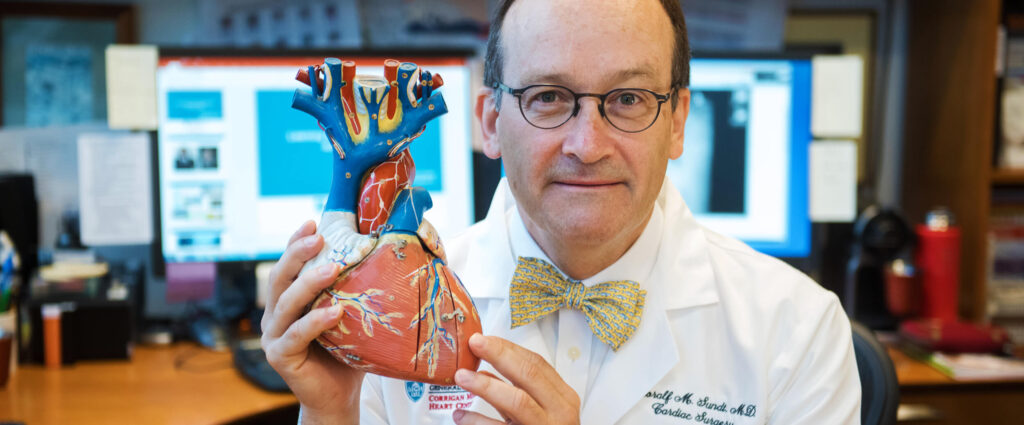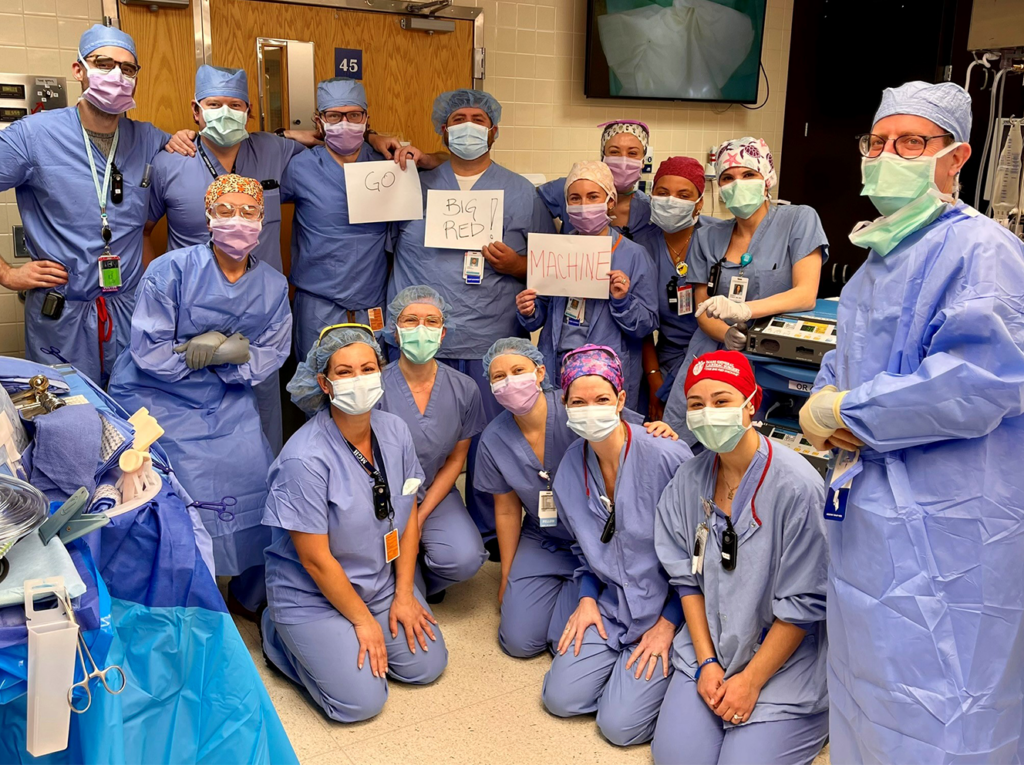This story was first published here.
Tara Benoit, 47, was an active, healthy mother of two boys living in southern New Hampshire when sudden chest pains changed her life forever.
A successful business owner and CEO of her own recruiting firm, she was also a dedicated athlete and participant in fitness competitions. But in May 2023, she started having episodes of severe chest pain that kept getting worse. Tara was eventually diagnosed with a spontaneous coronary artery dissection, or SCAD.
“It blows my mind that this happened when it did, because I was getting ready for my next fitness competition,” Tara says. She was in the best physical condition of her life.
SCAD is a rare condition where the coronary artery, a major blood vessel which supplies oxygenated blood to the heart, tears without warning. This causes bleeding within the wall of the vessel and disrupts blood flow to the heart muscle. It can lead to heart attacks and cardiac arrest. It’s such a rare condition that Tara had a hard time getting an accurate diagnosis and the right treatment.
Fortunately, she was referred to Sarah Tsiaras, MD, a cardiologist at Massachusetts General Hospital. Dr. Tsiaras is part of the SCAD Program within the Corrigan Women’s Heart Health Program, which is one of the few centers in the country that specializes in caring for patients with SCAD.
Unexplained Chest Pains
Tara’s chest pains started shortly after her family returned from vacation in May 2023. When she also started feeling a squeezing sensation of pressure in her heart, and tingling down her left arm, she went to the ER. Initial bloodwork and tests didn’t find anything wrong.
“One doctor suggested it might be anxiety,” Tara says. “I said, ‘No disrespect, but it’s not anxiety.’ It’s disturbing to me because I’ve met a lot of women in support groups, all different ages, with similar stories. We were written off as having anxiety, sent home because of the lack of knowledge.”
Two days after returning home from the hospital, Tara experienced even more severe chest pains in her heart, along with shortness of breath, pain in her arm, jaw and back, sweating and fainting. An ambulance took her to another hospital.
Despite a normal EKG (a test which records the heart’s electrical signals), her bloodwork showed elevated troponin levels. Troponin is a protein found in heart muscle cells. Its presence in Tara’s blood indicated that she had damaged heart muscles. Doctors performed a cardiac catheterization. They threaded a thin, flexible tube through Tara’s blood vessels to examine the heart arteries in more detail.
It was during this procedure that Tara received her life-changing diagnosis of SCAD, which had led her to have a heart attack. “I was very thankful to be alive, but also devastated with my diagnosis and this new condition,” she says.

Mass General’s SCAD Program
Tara found the SCAD Program when she began researching options to further her recovery. After her frustrating experiences trying to get a diagnosis and treatment, Tara appreciated the expertise at Mass General and felt comfortable with Dr. Tsiaras and the team.
“Everything was so seamless and so organized, and I hadn’t had that before. It was all so reassuring. She knew everything about me. They had talked about my case with other doctors before I even got there, and I was blown away. I just was so impressed with the level of care,” she says.
At Mass General, Tara was able to learn more about her serious new condition.
“Ninety percent of SCADs occur in women who have no cardiac history and who often don’t have the traditional risk factors for coronary artery disease, like high blood pressure (hypertension), high cholesterol, diabetes, smoking or family history. The most common age is around 45 to 55, the perimenopausal years, but it can sometimes occur during the time of pregnancy as well,” says Dr. Tsiaras.
The exact causes of SCAD, and why it mostly affects otherwise-healthy women, still aren’t fully understood.
“Sometimes it can be a combination of an underlying vascular abnormality compounded by an emotional stressor,” Dr. Tsiaras explains. At Mass General, doctors screen patients with SCAD for fibromuscular dysplasia. They also offer genetic testing to some patients. “More recently, we’re starting to think there may be a polygenic component, or multiple genes interacting together, leading to an increased risk for patients,” adds Dr. Tsiaras.
A Personalized Approach to Rehabilitation
In addition to screening for potential risk factors and causes, the SCAD Program connects patients to a multidisciplinary team including cardiac geneticists, vascular medicine specialists, interventional cardiologists, cardiac radiologists and a psychologist who specializes in working with heart patients. They work to develop individualized treatment and recovery plans for each patient.
“Unlike a traditional heart attack where the blood vessel is blocked by plaque, we try to manage it conservatively if we can. In most cases, the vessels will heal over a period of weeks if they’re left alone,” explains Dr. Tsiaras.
Health care providers also counsel patients on how to return to their regular lives. As part of her participation in a cardiac rehabilitation program, Tara saw a Mass General psychiatrist who helped her adjust to her new reality and connected with other SCAD patients she’s met at Mass General and through different support groups.

Becoming an Advocate
For someone used to being so active, Tara’s new limitations were frustrating, especially in the early days of her recovery. “I would walk up a flight of stairs and have to sit down for 20 minutes. I had to lie down most of the day, which is such a challenge as an active person,” she says.
As her artery healed and she became more stable, Tara channeled the motivation that led her to such success in business and in fitness competitions towards her recovery. She gradually ramped up her activity levels and eventually returned to the gym.
“My goal now, as I continue to heal, is to be more involved with raising awareness for all women’s heart health issues and especially SCAD. If I can prevent one person from having to suffer and go through what I went through, that would mean the world to me,” Tara says.
Dr. Tsiaras confirms that educating both patients and providers is key to raising awareness of SCAD. “Tara’s story is unfortunately not uncommon. I think educating women to know what symptoms to look for, that SCAD is a possible diagnosis, and how to advocate for themselves is important. We need to continue to educate emergency room providers and community hospitals about this diagnosis,” she says.
To learn more about the Corrigan Minehan Heart Center, please contact us.





